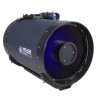Meade 14 inch Instruction Manual - Page 38
One-Star Alt/Az Alignment
 |
View all Meade 14 inch manuals
Add to My Manuals
Save this manual to your list of manuals |
Page 38 highlights
Note: Autostar II locates alignment stars based on the date, time, and location entered. The alignment stars may change from night to night. All that is required is for the observer to center the selected stars in the eyepiece when prompted. Tip: Try a Spiral Search The GO TO key also allows you to perform a "spiral search." A spiral search is useful when the telescope slews to an object, but that object is not visible in the eyepiece after the telescope finishes its search. (This sometimes occurs during an alignment procedure.) Press GO TO when the slew is finished and the telescope starts slewing in a spiral pattern at a very slow speed around the search area. Look through the eyepiece and when the object does become visible, press MODE to stop the spiral search. Then use the Arrow keys to center the object. 38 3. Set Home Position. Place the telescope in the home position. To Set the Home Position Manually: a. See Figs. 19 and 20, page 37. Loosen the telescope's Dec. lock (17, Fig. 1). Set the optical tube to 0° on the Dec. setting circle (Fig. 20). b. Tighten the Dec. lock (17, Fig. 1) to a firm feel only. c. Level the tripod base. d. Move the base of the telescope so that the computer control panel (13, Fig. 1) approximately faces South. e. Unlock the R.A. lock (12, Fig. 1) and turn the telescope's optical tube hori- zontally until it points North. See Fig. 37, page 52, for more information. f. Re-lock the R.A. lock (12, Fig. 1). Press ENTER. g. Press ENTER. 4 . Star Alignment. "Select Star" displays. Autostar II then displays a library of stars for the observer to choose from. Use the Scroll keys to scroll to a star on the list that you wish to align upon. Select a star that you can easily locate in the night sky. Press ENTER. 5. Center Star. The telescope slews to the star. Use the Arrow keys to move the telescope until the star is centered in the eyepiece. Press ENTER. 6. Center Star. Repeat procedure for the second alignment star. The telescope is aligned and you are now ready to use Autostar II's GO TO capabilities for a night of observing. One-Star Alt/Az Alignment One-Star Alignment requires some knowledge of the night sky. Autostar II provides a library of bright stars. One-Star Alignment is identical to Two-Star Alt/Az: Alignment (see TWO-STAR ALT/AZ ALIGNMENT, page 37), except only one star from the database is chosen by the observer for alignment. LX200GPS TIPS Mirror, Mirror... The LX200GPS telescopes provide features that allow you to control the primary optical mirror and focus functions for more precise viewing capability. One control feature is the primary mirror lock (9, Fig. 1). The primary mirror lock helps eliminate mirror flop. Mirror flop can sometimes occur when the optical tube slews to opposite sides of the sky and the primary mirror shifts out of position, causing the loss of focus and pointing precision. To prevent mirror flop: Rotate the primary mirror lock knob toward the "lock" position and adjust the tension to a firm feel. Another control feature is the zero-shift microfocuser (24, Fig. 1). The microfocuser allows for "jiggle-free" focusing. It also allows you to achieve focus without causing a viewed object to move out of position in the eyepiece. Some tips to help you make the most out of your microfocuser (see FOCUSING THE EYEPIECE USING THE MICROFOCUSER, page 17, for more detailed instructions): 1. Set the "travel" (extension) of the drawtube of the microfocuser to about halfway. 2. Rotate the mirror lock knob towards the "unlock" position, until it feels loose. 3. Use the coarse focus control (6, Fig. 1) to achieve a rough focus of a bright star. 4. Rotate the mirror lock knob towards the "lock" position and adjust the tension to a firm feel; this action serves to lock in the coarse focus. But make sure that you don't adjust or bump the coarse focus knob once you have tightened tension on the mirror. If you do, reset the coarse focus as described above. 5. Press the Autostar II Focus key and then use the Up and Down keys to control the microfocuser. If desired, you may change the focus speed. 6. You may need to repeat this procedure when you change eyepieces.















